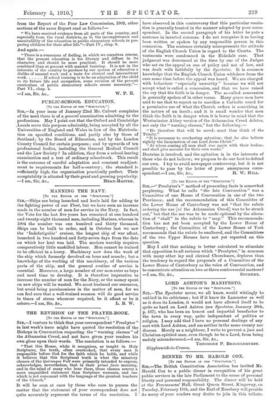THE REVISION OF THE PRAYER-BOOK.
[TO THE EDITOR OF THE " SPECTATOR:]
SIR,—I venture to think that your correspondent " Presbyter " in last week's issue might have quoted the resolution of the Bishops in Convocation respecting the "warning clauses" of the Athanasian Creed, and not have given your readers his own gloss upon their words. The resolution is as follows :— "That this House, while it recognises, as taught in Holy Scriptures, the truth, often overlooked, that every man is responsible before God for the faith which he holds, and while it believes that this Scriptural truth is what the minatory clauses of the Quicunque Vult were primarily intended to express, acknowledges, nevertheless that in their prima facie meaning, and in the mind of many who hear them, those clauses convey a more unquali8ed statement than Scripture warrants, and one which is not consonant with the language of the greatest teachers of the Church."
It will be seen at once by those who care to pursue the matter that the statement of your correspondent does not quite accurately represent the terms of the resolution. I have observed in this controversy that this particular resolu- tion is generally treated in the manner adopted by your corre- spondent. In the second paragraph of his letter be puts a sentence in inverted commas. I do not recognise it as having been written or spoken by any responsible person in this connexion. The sentence certainly misrepresents the attitude of the English Church Union in regard to the Courts. The vestments were condemned in the Ridsdale case. That judgment was denounced at the time by one of the Judges who sat on the appeal as one of policy and not of law, and was dealt with faithfully by the Spectator. It is common knowledge that the English Church Union withdrew from the case some time before the appeal was beard. We are charged with behaviour "especially unworthy" because we will not accept what is called a concession, and that we have raised the cry that the faith is in danger. The so-called concession is generally spoken of in other terms. Many grave men have said to me that to expect us to sacrifice a Catholic creed for a permissive use of what the Church orders is something in the nature of an insult; and it is small wonder that men think the faith is in danger when it is borne in mind that the Westminster Abbey version of the Atha,nasian Creed deletes, not only the "warning clauses," but the following :—
"He therefore that will be saved: must thus think of the Trinity."
"It is necessary to everlasting salvation : that he also believe rightly the Incarnation of our Lord Jesus Christ."
"At whose coming all men shall rise again with their bodies: and shill give account for their own works."
Doctrine is involved, and the agitation is in the interests of those who do not believe; we propose to do our best to defend our own. I try to avoid newspaper controversy, but it is not possible to pass by the letter of your anonymous corre-










































 Previous page
Previous page